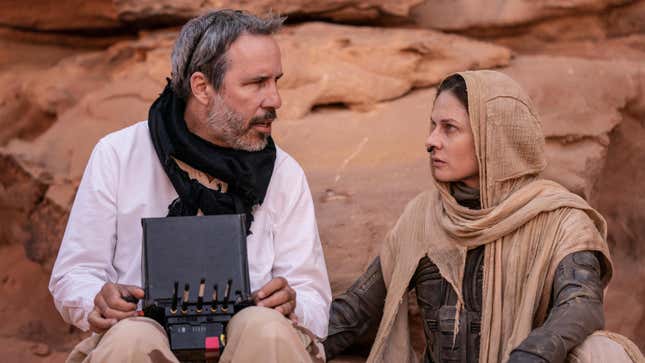When Dune: Part One ended on a breathless cliffhanger, audiences at least knew Dune: Part Two was on the way. Part Two does something similar, and while the odds are good that there will be a sequel, it’s not coming immediately.
Nevertheless, the movie ends similarly to how Frank Herbert ended his novel, and director Denis Villeneuve was very confident he had to do the same thing. “I was adamant,” the director told io9. “I was like 100% certain that it was the best way. I love movies that end like that, like in a strong statement.”
Below, watch and read more from Villeneuve’s discussion of the ending, and read his answer about Part Two’s super secret cameo.

At the end of Dune: Part Two, we watch Paul Atreides kill Feyd-Rautha, thereby staking his claim as the next emperor of the galaxy. He then offers to marry the current emperor’s daughter, Irulan, to keep his bloodline alive, which deeply offends Paul’s Fremen girlfriend, Chani. When Paul hears that the other powers in the galaxy won’t acknowledge his claim, he aims to start a war by destroying the spice fields of Arrakis. With this holy war hanging in the balance, the film ends with an angry, defiant Chani leaving Paul and heading back into the desert.
Basically, Paul has fully embraced his God-like destiny and claimed power—but at the expense of the woman he loves, and maybe what made her love him in the first place. It’s a down ending that leaves much to the imagination, but it’s very close to how Herbert ended his book and that’s why Villeneuve decided to end the movie that way too. Here’s our discussion.
Germain Lussier, io9: Herbert’s book ends rather abruptly and you lean into that and do it the same way. Hopefully, fingers crossed, we’ll get to see Dune Messiah at some point—but just in case that doesn’t happen, was there ever any thought to adding a bit more closure here at the end of Part Two?
Denis Villeneuve: No, it was always like that. It was always like that in order to bring this idea home. The idea [of] that thing that becomes out of control. That betrayal and that tragedy. I had to finish there. And for that I was adamant. I was like 100% certain that it was the best way. I love movies that end like that, like in a strong statement.
io9: And the final shot of Chani, how did you come up with that?
Villeneuve: Oh, in the screenwriting. It’s something that I figured out early and as I was writing the screenplay—I co-wrote this screenplay with Jon Spaiths of course—but this is an idea that I brought and I was like 100%. It was the best way to finish the movie.

The other big spoiler in Dune: Part Two is that the role of Paul’s as-yet unborn sister, Alia, is played by Anya Taylor-Joy. She only appears briefly in a single scene, in one of Paul’s future visions, but we had to ask Villeneuve about it and he was very cautious.
io9: Before the movie a friend and I were discussing Alia and wondering how she was going to fit into this. So it was very exciting to see Anya Taylor-Joy pop up quickly there. I would like to know how that happened and then also, if you do get to make Messiah, would she play that role? Because ages are a little off.
Villeneuve: It’s an idea that I had in the back of my mind as I was writing and it’s an idea that—I had met her as I was casting—I had her in mind for that role. And it’s something that I love. It was like, projecting ideas of what Dune Messiah could be. And it’s very exciting for me.
io9: Okay, but would she be in that then?
Villeneuve: I cannot say.
Read the rest of our interview with Denis Villeneuve here and check out Dune: Part Two, now in theaters. (Hopefully, you already did that though since we just talked spoilers.)
Want more io9 news? Check out when to expect the latest Marvel, Star Wars, and Star Trek releases, what’s next for the DC Universe on film and TV, and everything you need to know about the future of Doctor Who.




















+ There are no comments
Add yours